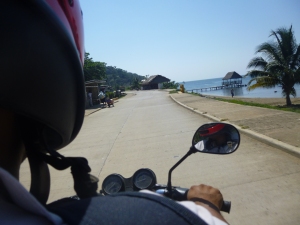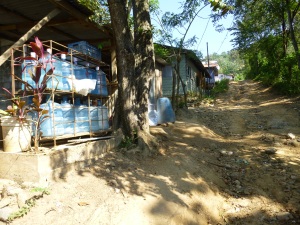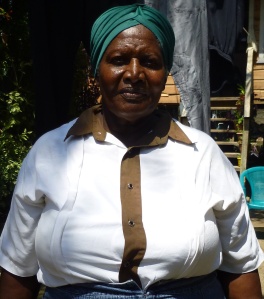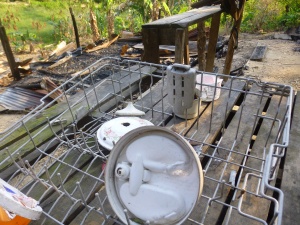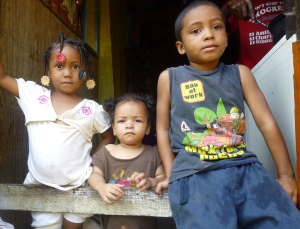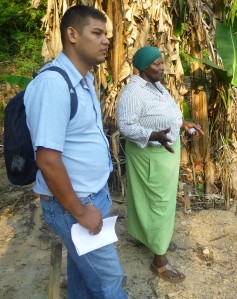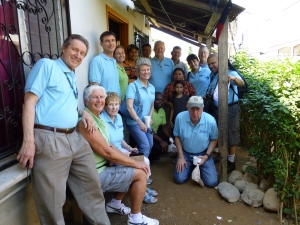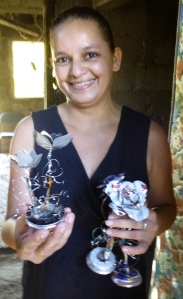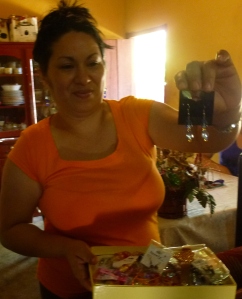The twin cities of La Esperanza and Intibucá were already in full holiday swing last week. With many locals, I ended the week at a Christmas event in the main plaza filled with dancing, music and ponche–a delicious pineapple drink served hot to cope with the cold weather. Paintings from Intibucá, Marcala and Choluteca were on display farther from the stage, giving people a chance to appreciate the local art scene as well.

Here, a group of dancers perform in La Esperanza’s main plaza.
When I arrived to the plaza, the event was already underway, with a folk dance performance. The act ended with a few audience members of all ages brought up to dance. A young singer came up next to perform a couple songs, followed by a reggae duo from Corozal, a small town outside of La Ceiba where we also have clients.
Amidst the holiday preparations, Adelante clients were busy at work preparing for greater sales. It was great to meet so many women preparing their businesses for a Christmas sales boost. Although the increased profits made during the Christmas season will unlikely be kept up for the year to come, the extra money helps these women to save, and to offer their families a little bit more in the weeks to come.
On a stroll through the market with another Credit Officer, Yovanny, we saw Ricarda, who had stayed late at the market just to chat with a fellow Adelante client. Ricarda had sold out of her tortillas quickly and was happy to spend a couple hours supporting her friend as she finished off her tortillas sales. With such high demand for the staple, they don’t have to worry much about competing with each other. And by the time I met with Santos, she told me to come back early the next morning so that I could take a picture when her basket would still be full of rosquillas, quesadillas and other sweet breads popular in the area.

In anticipation for Christmas, Carmen has been busy making dulce de leche and preparing delicious chicken tacos.
I met Cintya at her stand, who has enjoyed greater shoe sales as customers are busy buying gifts and looking for new shoes for themesleves. Carmen was hard at work making dulce de leche when I popped in for a visit and lunch with our Intibucá Office Supervisor Ethel and Carmen’s Credit Officer David. From her home, Carmen prepares typical food like the tacos we ordered for lunch, but also started making and selling dulce de leche a couple years ago.

Ethel gets ready to dig into her order of chicken tacos!

Serapia’s convenience store will soon be ready to sell meat and other frozen products, thanks to her coming Individual Loan!
Serapia, however, must be the most joyful of them all. I met Serapia at her house where she lives with her husband and four of her five children. Here she runs a small convenience store and raises animals to sell. With Christmas approaching she has already sold two of her three turkeys and is getting ready to sell her three pigs. Unfortunately, she has struggled to keep her chickens safe from the mountain cats who come out at night, making these less profitable.
After four loan cycles Serapia has qualified for an Individual Loan, which she will be receiving this Friday! The loan of L. 12,000 ($600) will allow her to purchase a freezer for her store. With a new freezer, she’ll be able to see her profits increase, telling me, “The fridge I have is only good for storing drinks. With a freezer I’ll be able to start selling meats–products that my customers have frequently asked me for.”

From her home, Serapia is able to engage in multiple activities to support her family–selling basic goods, raising animals, attending to household chores and caring for her children.
She started her store three years ago with about $40 of earnings left over from selling her fattened pigs. After hearing about Adelante and becoming a member of a local assembly, Serapia is now able to make much larger investments into her business. Her first group loan was for about $192 and is now paying back a loan for about $305. The Individual Loan will now give her the opportunity to invest and grow her business in a way that she would not have been able to previously.
The Christmas season is a busy time for everyone at Adelante, as many clients look to take out new loans to take advantage of the holiday boost in the economy. As for me, I’m looking forward to my first Honduran Christmas and New Year. The holiday spirit shown in Intibucá and La Esperanza was just the thing to get me ready.

